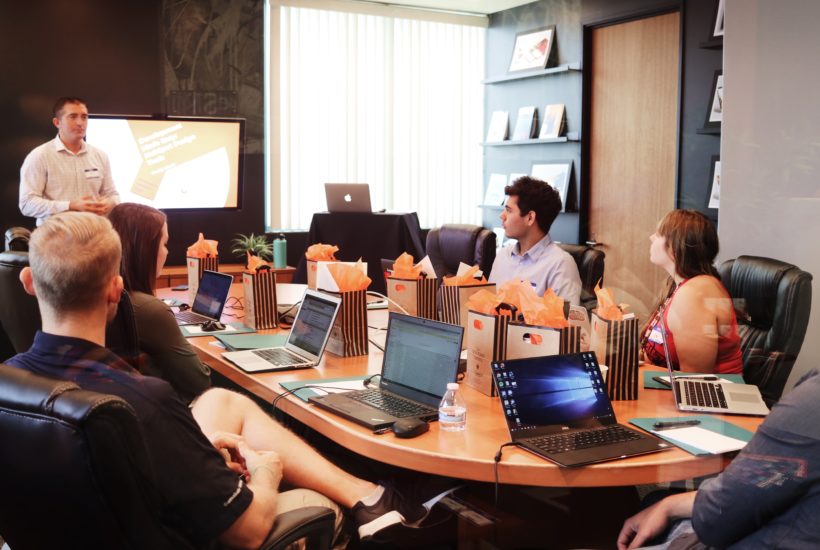Business
Amid the Great Resignation, It’s Time to Figure Out What Workers Want
We haven’t seen the end of the Great Resignation — and we won’t until employers stop buying into the myth that employees don’t want to work. Get to the bottom of any employer brand awareness issues, and then further develop that brand to recruit the talent you already have. To stop the cycle and avoid the ramifications of the Great Resignation, you must be ready when employees have their Great Epiphany.

As the job market works to come back to life after 18 months of COVID-19, we’ve all heard a similar refrain: No one wants to work. Indeed, between April and June 2021, almost 12 million workers left their jobs in a movement that’s been dubbed the Great Resignation. The mass exodus has affected everyone but has especially prevented low-wage, low-opportunity employers from adequately restaffing.
The prevailing narrative is that unemployment benefits and other measures have driven people to stay home and collect from the government instead of going out and earning their keep, but this is nonsense. The real issue runs much deeper.
People want to work — they just don’t want to be underappreciated or misled about what that work is like. Attracting the right talent, then, isn’t just a matter of offering enticing perks; it’s about defining and building an employer brand.
Reframing the Great Resignation
The term “the Great Resignation” emphasizes the outcome, but employers would be wise to turn their attention to the cause — something I refer to as the Great Epiphany.
After experiencing the mass trauma of the COVID-19 pandemic, many people have realized there are better opportunities out there. They don’t want to slave away at low-wage, low-opportunity jobs for the rest of their working lives. People are quitting in droves because their experiences as employees no longer align with their priorities and desires for their lives and careers.
It’s time for employers to pause, reassess the situation, and practice empathic listening to understand what workers want.
Ultimately, the bank’s leadership listened to what workers wanted and provided the option to telecommute. This move boosted morale, productivity, and retention among existing employees while also expanding the hiring team’s talent pool. Conventional working environments can pose barriers to disabled folks and those providing care to family and loved ones. Having a remote option allowed more people from diverse backgrounds to join the team.
Communicating the Total Employee Experience
Turnover in lower-paying customer service roles is incredibly costly and disruptive. Your customer-facing employees are the faces and voices of your organization, and it’s hard to maintain brand continuity when those faces and voices are frequently changing.
To stop the cycle and avoid the ramifications of the Great Resignation, you must be ready when these employees have their Great Epiphany. You have to re-recruit the talent you already have with a balanced and authentic employee value proposition or EVP. If you overstate the benefits of a position without also acknowledging its most raw realities, you risk setting false expectations. That’s the opposite of what workers want.
Don’t sugarcoat things. Remind people why this job is worth doing. Talk about the purpose, impact, and belonging that can be found in these roles. How can people make a difference at work? Where do they fit? How will this job serve your company as well as them as individuals? This is the foundation of your employer brand. Build on it wisely.
We haven’t seen the end of the Great Resignation — and we won’t until employers stop buying into the myth that employees simply don’t want to work. Get to the bottom of any employer brand awareness issues, and then further develop that brand to recruit the talent you already have. This way, employees who do have a Great Epiphany will come to realize that your company is precisely where they want to be.
—
(Featured image by Campaign Creators via Unsplash)
DISCLAIMER: This article was written by a third-party contributor and does not reflect the opinion of Born2Invest, its management, staff or its associates. Please review our disclaimer for more information.
This article may include forward-looking statements. These forward-looking statements generally are identified by the words “believe,” “project,” “estimate,” “become,” “plan,” “will,” and similar expressions. These forward-looking statements involve known and unknown risks as well as uncertainties, including those discussed in the following cautionary statements and elsewhere in this article and on this site. Although the Company may believe that its expectations are based on reasonable assumptions, the actual results that the Company may achieve may differ materially from any forward-looking statements, which reflect the opinions of the management of the Company only as of the date hereof. Additionally, please make sure to read these important disclosures.

-

 Crypto2 weeks ago
Crypto2 weeks agoXRP vs. Litecoin: The Race for the Next Crypto ETF Heats Up
-

 Crypto1 day ago
Crypto1 day agoCrypto Markets Surge on Inflation Optimism and Rate Cut Hopes
-

 Biotech1 week ago
Biotech1 week agoSpain Invests €126.9M in Groundbreaking EU Health Innovation Project Med4Cure
-

 Biotech4 days ago
Biotech4 days agoAdvancing Sarcoma Treatment: CAR-T Cell Therapy Offers Hope for Rare Tumors

























